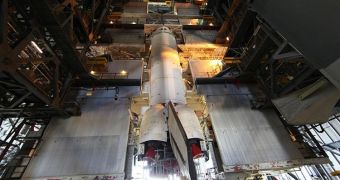Officials at the American space agency have decided to postpone the launch of space shuttle Discovery to November 30, in order to give engineering teams enough time to complete repairs on the orbiter, and to scan the spacecraft for any other malfunctions.
Thus far, the space shuttle's launch has been delayed a total of five times. Two of the delays were caused by OMS pod leaks, another one by a delay in an electronic engine controller, the fourth due to rainy conditions, and the fifth due to a hydrogen leak detected at the shuttle's ground umbilical carrier plate (GUCP).
The GUCP connects the orbiter to its massive orange external fuel tank, which holds up to 520,000 gallons of cryogenic fuel that propels the spacecraft out of the planet's atmosphere.
Engineers who conducted surveys of the structure have determined that both a leak and a crack exist on its surface, and informed mission controllers that it's impossible for them to conduct the needed repairs within a couple of days.
As such, NASA officials decided to delay the take off for more than 24 days, thus giving experts ample time to handle whatever problems might still exist on the orbiter. The STS-133 flight is Discovery's last planned sortie to the International Space Station (ISS).
“There's about a seven-inch long crack with what we call an offset, which means it's cracked and moved a little bit,” explains the NASA shuttle integration manager, Mike Moses.
“That gives a place for ice to form, and that's not something we like to see. I don't know if that would have passed our criteria to be 'go' for launch, but it certainly would have been something that would have generated a whole lot of discussion,” he said at a briefing.
The official avoided to give additional details of the nature of Discovery's damage. However, he expressed confidence that repair crews will be able to complete the necessary work in time for a 4:05 am EST (0905 GMT) launch on Tuesday, November 30.
“We have a lot to do before we actually settle in on a new launch date. We're going to make sure we fix the problems and then worry about the launch date later,” the expert said.
“So, November 30 is the first time the window opens, and I can't commit to saying that's exactly when we're going to launch, but that's what we're going to start setting schedules for,” he adds, quoted by Space.
The shuttle was supposed to take off for the ISS on November 1, delivering a permanent logistics module and a humanoid robot called Robonaut 2.
During the 11 days that Discovery will spend attached to the station, two of its astronauts will perform two extra-vehicular activities (EVA), for maintenance purposes.

 14 DAY TRIAL //
14 DAY TRIAL //